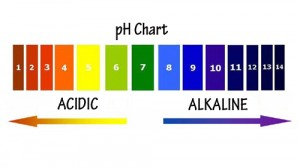In biochemist, it is essential to maintain a consistent pH, temperature and pressure in order to accurately predict the outcome of any given reaction. Pressure in the human body tissues remains relatively constant, unless we are living underwater or at extremely high elevation. Temperature can vary slight based on our metabolism, thyroid function or more acutely with a cold or flu. The most important factor however of biochemical efficiency in our bodies relies on tissue pH.
pH is associated with the balance of acids and bases. Subtle changes in pH can have a big impact on how efficient our bodies can work. From energy production to nerve conduction …. pH plays a part in everything!
Many chronic health concerns come with chronic low grade acidosis. This can easily be tested in the blood using the electrolytes potassium, sodium, bicarbinate (HCO3-) and chloride. When these electrolytes start to shift, this is a strong indicator that the body is trying to correct a pH issue at the the cost of lung and kidney function. The major storage buffer in the body, calcium, is transported into the blood and lost through the kidneys to try and help keep acid levels from harming our tissues. Over a period of time the body is not able to keep up with this demand and we start to develop dieases such as osteoporosis, osteoarthritis, heart disease and even cancers.
Without getting to technical, the main way to address low grade acidosis in the body is to eat your vegetables. Unfortunately in this case starchy carbohydrates don’t count. Vegetables should be colored or green. Ideally we are eating 1 cup of greens per day, slightly steamed or lightly stir-fried. You can also have your vegetables prepared using a masticating juicer! Another and more powerful approach is make one of my mentors favorite treatments for low grade acidosis …. this is called Dr Sandy Woods alkalinizing broth. Simply add equal parts of beans, carrots, potato, zucchini and celery into a large pot and fill the pot to 4 times the hieght of your veggies with water. Simmer for 30 to 40 minutes. Strain of the broth and enjoy 1 cup per day at around 4 pm in the afternoon. You might want to add some sea salt to taste.
Without doing a blood test to determine if you have a problem with low grade acidosis … please pop into the clinic with a fresh morning urine sample and I will test your urine using a chemstick to determine if this treatment is right for you!
